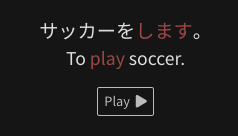Wowww, 2 years later and this helped me so much. I was google searching “should I memorize the words introduced by Bunpro?” because I was so confused about how I was supposed to know the words they were introducing, I thought it was just a grammar app.
Your post made me realize that the word I’m conjugating is literally written right next to the blank space and there’s an arrow. I wish they had like a “hey, this is a new question format, here’s how to do it!” rather than just showing an arrow and expecting me to get it.
Edit: Nvm I just realized some of the questions really do expect you to just have the word memorized, it’s kind of a bad experience, I’m not here to learn new words that’s what anki and WK are for, I wish it just showed me the word above the sentence and I can figure out the conjugation from there.



